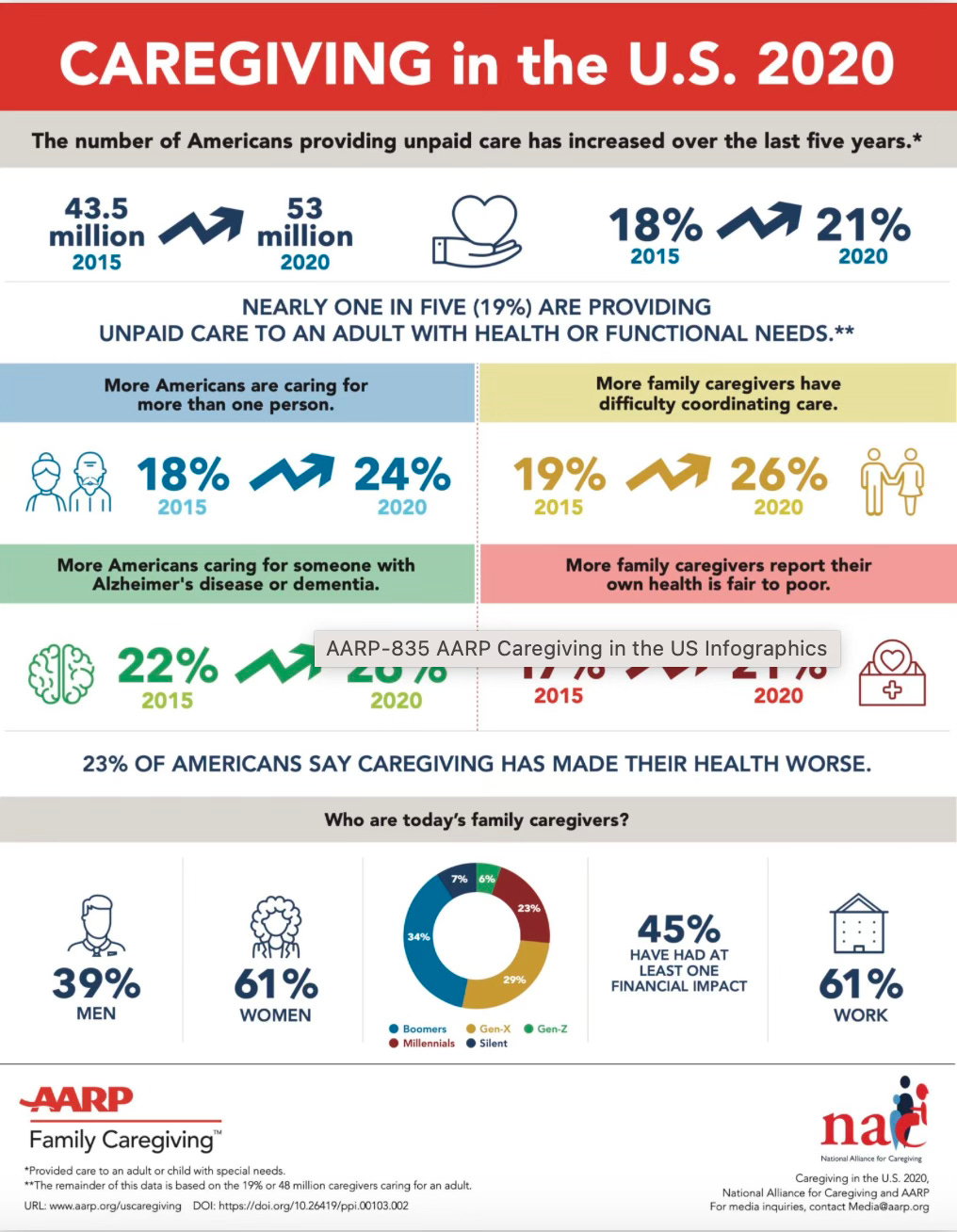Is this you? One or both of your aging parents or in-laws requires help with running errands, preparing meals, or managing their medical care. Perhaps it’s your spouse, partner, child, or sibling that needs similar attention. You’re devoting hours every week to a loved one or friend, and you’re going through perimenopause.
You’re not alone.
Who Are America’s Caregivers?
Caregiving is often defined as providing assistance on a regular basis for a friend or family member with a health problem or disability. While caring for another is a labor of love, it can also be stressful, sad, and lonely. The role of caregiver takes on new meaning when menopause is in the mix. I speak from experience.
As my mother’s caregiver for about three years in my early 50s, I felt like I was the only one shouldering a massive amount of responsibility while also juggling brain fog, hot flashes, and poor sleep. It turns out that I had plenty of company. As of 2020, about 53 million American adults were unpaid caregivers and roughly two-thirds of them were women. With an average age of 49, it’s safe to say that many caregivers are in the throes of perimenopause.
Caregiving is time-consuming, and menopausal women have less time to devote to themselves when they probably should be doing the opposite to help deal with the physical and psychological changes that menopause brings. Duties vary, but one in three caregivers log 20 hours or more per week, according to the Centers for Disease Control and Prevention. Caregivers may also have a job, a family, or both that requires attention, leaving even less time to enjoy balanced meals, exercise, and get the sleep they need, which are critical at midlife.
Too Many Balls In The Air
For me, caregiving meant crushing stress much of the time. I was overwhelmed by trying to keep my mom safe (she fell at home on three occasions and couldn’t get up by herself before finally consenting to having paid help in the house), dealing with Emergency Department visits, hospitalizations, doctor’s appointments, and providing emotional support. All of this was going on as I was struggling to pay attention to my marriage, three teenage daughters, career, and a dog.
Everyone knows long term stress is not good for you but that’s often what you get when caregiving on menopause. Constant stress is associated with a higher risk for elevated blood pressure, heart attack, and stroke, conditions that start to increase with lower estrogen levels. One unpublished study suggests that caregiving itself may exert a unique influence on menopause symptoms.
Research presented at the recent annual meeting of The Menopause Society found that women ages 45 to 60 who spent a minimum of 15 hours weekly on caregiving reported more moderate to severe psychological and physical symptoms, including urogenital issues, compared to non-caregivers. After the researchers adjusted for caregiver relationship, employment status, current hormone therapy use and daily stress level, “heavy caregivers” (15-plus hours weekly) were 57% more likely to say they experienced a worse menopause symptom burden when researchers compared them to responses from non-caregivers.
Caregiving and Your Brain
Caregiving can require accuracy, especially if you’re managing finances, doling out multiple medications, and organizing medical appointments. Ironically, the stress of caregiving can also affect brain function (as if menopausal women didn’t already have trouble concentrating and thinking clearly). A 2019 CDC study found that one in eight caregivers over the age of 45 reported a decline in their memory over the past year.
Caregiving can increase irritability, anger, and grief at a time and menopausal hormonal fluctuations only add fuel to the fire. Tending to another person’s needs can tax even the most mentally and physically fit person, never mind a woman who isn’t feeling her best because of menopause.
Attention, Please!
It’s important to safeguard your physical and mental health as much as possible. If you don’t take care of yourself, you can’t care for others. It’s trite, but true. Here are some ways to tend to your own needs.
Keep meals simple and nutritious. Good nutrition is always important, but even more so now. As you lose estrogen during perimenopause and after menopause occurs, the risk for muscle tissue decline, bone disease, and heart disease creeps up. Simple meals that are low in saturated fat and sodium and packed with fiber are good for your entire body and may help with overall weight control and keeping belly fat to a minimum. For example, a bowl of fortified cereal with low fat dairy or soy milk and fruit; a tuna fish sandwich with baby carrots; and store-bought rotisserie chicken, packaged salad greens, and crusty whole wheat bread are examples of quick and balanced meals. Use nutritious convenience products, such as plain frozen fruits and vegetables, cherry tomatoes, carrot sticks, and canned tuna, salmon, and beans to save time. Snack on high-protein, fiber-filled combos like sliced apple and a carton of non-fat Greek yogurt instead of cookies, crackers and chips. It’s probably a good idea to take a daily multivitamin to cover most nutrient gaps. Choose one without iron if you’re post-menopausal.
Get the rest you require. If you can’t sleep because you’re having night sweats (hot flashes that happen when sleeping), speak with your doctor about your medication options. Do what you can to relax before bedtime to make falling asleep and staying asleep easier, including avoiding caffeine and alcohol in the afternoon and evening, avoiding screens while in bed, and keeping your bedroom cool and quiet.
Live your life. You’re more than a caregiver, although it may not seem that way when you’re always on call. Maintaining relationships outside of caregiving isn’t easy, but it can help you preserve your perspective during midlife, which is when many women experience a loss of sense of self. It’s easy to withdraw because you think nobody understands your situation, but it’s bad for your mental health. Schedule “dates” with friends or a partner at least once a month so that you have something to look forward to.
Set boundaries. Instead of doing everything yourself, ask family members to pitch in with the housework, yardwork, errands, and hands-on help with your loved one. Consider hiring a grocery delivery service, housecleaner, or someone to do the yardwork. If you can’t afford it on your own, ask your siblings or other family members to contribute.
Take all offers of help. Stop saying “That’s OK, I’ll do it.” When someone offers to make a meal, or sit with your loved one for a few hours, a day, or overnight, jump at the chance.
Establish time to relax. Caregivers sacrifice time with friends and family, and they often don’t get the relaxation they need, especially as menopausal women. Even 30 minutes a day to exercise or nap can be helpful to prevent burnout. If your finances allow, hire a professional caregiver for a few hours every week for a regular break from your duties.
Talk about it. It’s natural for caregivers to become frustrated, anxious or depressed, and menopause itself can also worsen your outlook on life. Many caregivers are dealing with loved ones that won’t get better, and you may be mourning that person even while they are still alive. Feelings can take a toll on the body. Anxiety and depression are associated with an irregular heartbeat, reduced blood flow to the heart, inflammation, and digestive problems. It’s perfectly normal to feel sad about your situation, but don’t keep it to yourself. Talk with friends and family about your situation instead of suffering in silence. Join a support group that can provide encouragement and help solve problems or seek help from a mental health professional to process your emotions.
Get moving. Physical activity is a stress-reliever and it can help you sleep better. No need to join a gym to reap the benefits of moving. There’s a variety of free workout videos online. Walking outside is relaxing and provides a much-needed change of scenery.







Great article that really hit home as someone who was in this situation for several years with in laws. Add in another layer of stress while also trying to manage care and help a parent, who lives 2 flights away and it can be very overwhelming. Doing what we can to care for ourselves - not self soothing but true self care is critical.